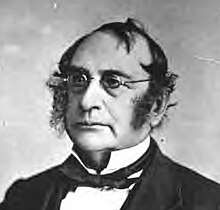Alexander Rives
| Alexander Rives | |
|---|---|

Judge Alexander Rives
|
|
| Judge of Virginia Supreme Court of Appeals | |
|
In office 1866–1869 |
|
| Judge of United States District Court for the Western District of Virginia | |
|
In office 1871–1882 |
|
| Nominated by | Ulysses S. Grant |
| Succeeded by | John Paul |
| Personal details | |
| Born | June 17, 1806 Nelson County, Virginia |
| Died | September 17, 1885 Charlottesville, Virginia |
Alexander Rives (June 17, 1806 – September 17, 1885) was a Virginia lawyer, politician, and federal judge.
Rives was born in Nelson County, Virginia. He attended Hampden-Sydney College from 1821 to 1825 when he graduated; and the University of Virginia, graduating in 1828. He was admitted to the bar and began private practice. He was a member of the state convention of 1850–51; of the House of Delegates in 1852–53; and of the Virginia State Senate in 1859–61.
He was the son of Margaret J. Cabell and Robert Rives. Three of his brothers—Robert, Jr., George, and William Cabell Rives—also served in the General Assembly. Rives was the uncle of Edward A. Pollard, who edited the Richmond Examiner along with Robert William Hughes. Rives was the great-uncle of Alexander Brown, author of several books on the early history of Virginia and of The Cabells and their Kin (1895).
Politically, Rives like his brother William was a Democrat until 1840, then a Conservative, then a Whig, then a Republican. He opposed the secession of Virginia.
Rives married Isabella Bachem Wydown in 1829, and they had ten children before she died in 1861. His second marriage, to Sally Kearsley Watson, was childless.
Rives served as the ninth Rector of the University of Virginia from 1865 to 1866.
On December 19, 1866, he was elected as a judge on the Supreme Court of Appeals and remained on the court until 1869, when he was not re-elected.
In 1870, Rives ran for the U.S. House of Representatives, losing to Richard Thomas Walker Duke. Duke's son recalled of this campaign that Rives "had 'ratted' and became a 'scalawag' republican," who obtained a pardon for his opponent Duke, to remove Duke's disability from seeking office, without charging Rives's usual fee of up to $500.
...
Wikipedia
